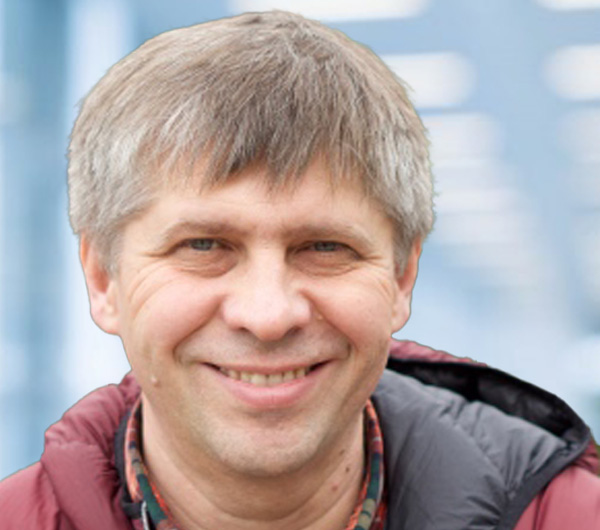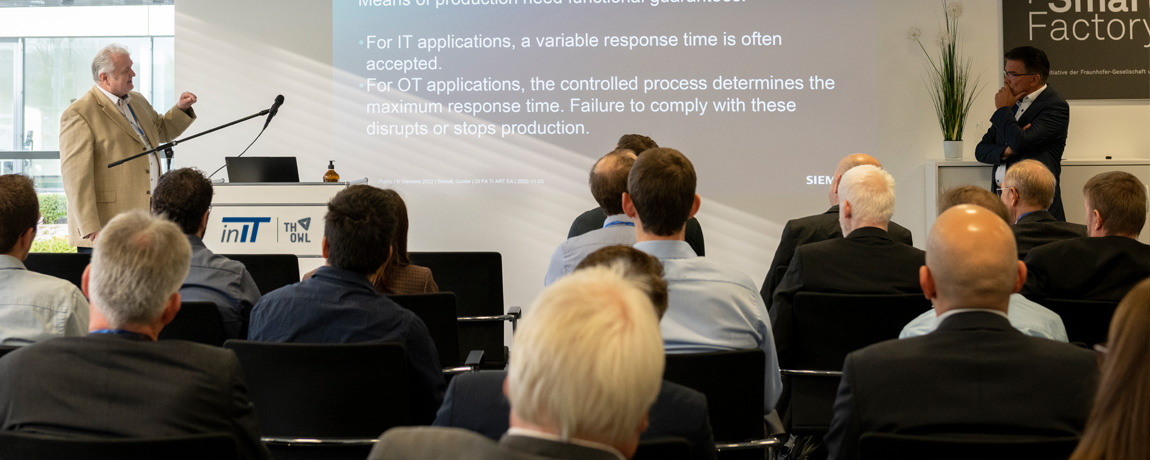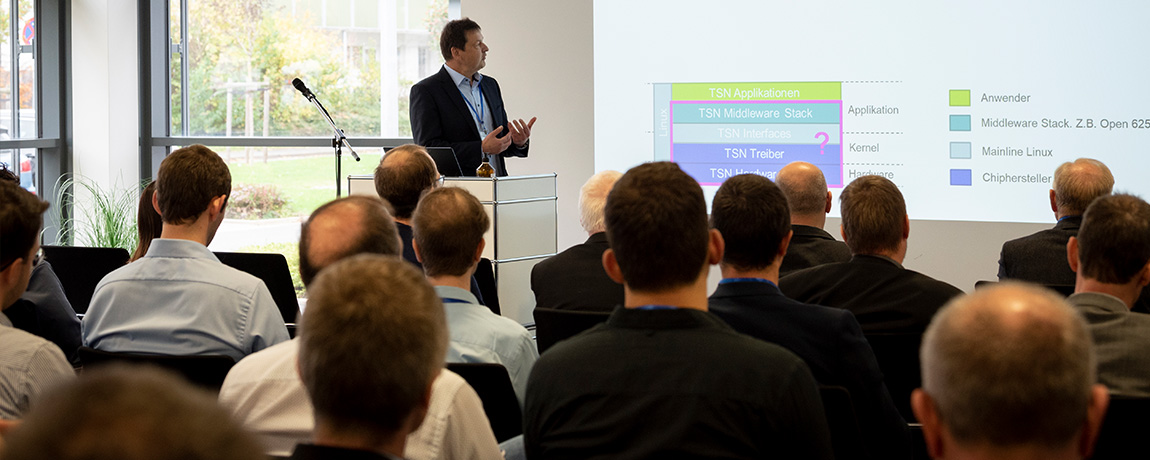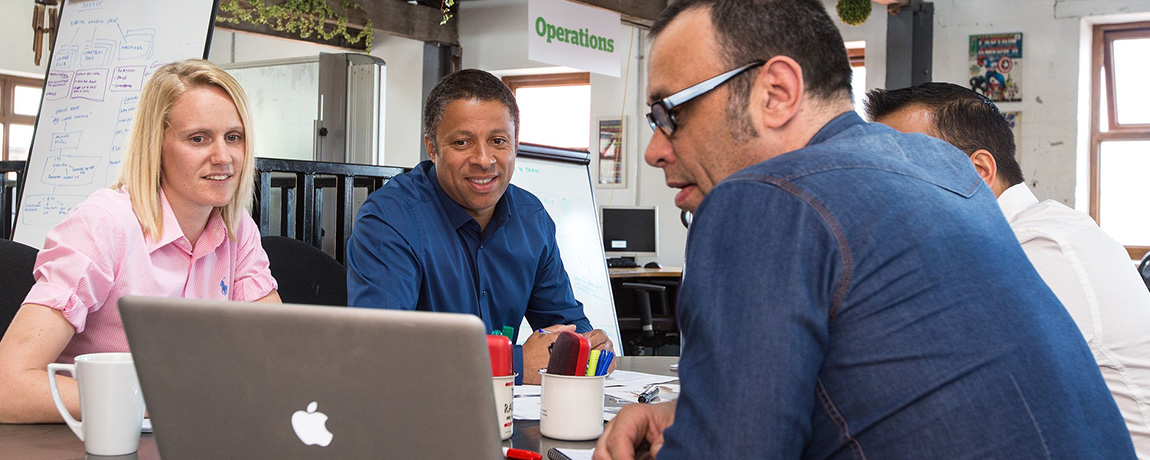Technical Tracks
Program Co-Chairs:

Thilo Sauter
TU Wien, Donau-Universität Krems, Austria

Lucia Seno
CNR-IEIIT, Italy

Henning Trsek
Institute industrial IT | Technische Hochschule Ostwestfalen-Lippe, Germany

Valeriy Vyatkin
Luleå University of Technology , Sweden
“Let’s go invent tomorrow instead of worrying about what happened yesterday.”
Steve Jobs
TT01: Industrial Cyber-Physical Systems, Industrial Agents and Applications
Chaired by: William Dai, Ilya Kovalenko, Luis Ribeiro
Focus
This track focuses on cutting edge technologies related to the industrial cyber-physical systems, industrial agents and applications. Industrial cyber-physical systems and industrial agents are the key for enabling autonomous manufacturing in Industrial 4.0 and Industrial Internet. In this track, all industrial CPS and agents related researches will be covered from all perspectives of industrial applications including reference architectures, data models, multi-agent systems, industrial computing and edge computing and much more.
Topics
-
Industry 4.0 Technologies, Solutions and Applications
-
Industrial Digitalization and Design Process
-
ICPS Architectures, Reference Models and Life Cycle Management
-
Model-Driven Engineering in Industry ( AutoML, PackML, B2MML, OPC-UA, MTP)
-
Industrial Multi-Agent Systems
-
Industrial Internet of Things (IIoT) and Industrial Internet of Services (IIoS)
-
Service-Oriented Architectures and Microservices in Industrial Automation
-
Connectivity, Networking and Interoperability in Edge-Cloud infrastructures
-
Artificial Intelligence, Machine Learning and Big Data for ICPS
-
Digital Twins in ICPS
-
ICPS Privacy, Fault Tolerance, Safety and Security
-
CPS Synthesis and Verification
-
Human Factors in ICPS and Hybrid human-cyber intelligence technologies in Industry
-
Performance Measures and Benchmarking for ICPS
-
Educating and Learning ICPS in Industrial Informatics
TT02: Artificial Intelligence in Industrial Applications
Chaired by: Daswin De Silva, Muhammad Khan, Gian Antonio Susto
Focus
This technical track focuses on current and emerging topics of artificial intelligence that are relevant and important for industrial applications and industrial information technologies. It is aligned to the transformation of industrial informatics from model-based solutions to generative, data-driven solutions that address the challenges of dynamic and non-deterministic digital environments.
Topics
-
Machine Learning
-
Deep Learning in industrial applications
-
Hyperdimensional computing for energy efficient machine learning on the Edge
-
Automated machine learning
-
Online learning from data stream
-
Unsupervised machine learning
-
Scalable machine learning
-
Machine learning for multimodal information fusion
-
Interpretability and traceable machine learning
-
Text, image, audio, video and social media analysis in industrial applications
-
-
Semantic Reasoning and Digital Twins
-
Semantic models for industrial applications
-
Probabilistic reasoning on IoT data
-
Combined reasoning and machine learning in digital twins
-
Context and semantic learning for industrial domain expertise
-
Digital thread models
-
-
AI methods for making Human-Machine Interaction Intelligent
-
AI methods for making Human-Machine Interaction Intelligent
-
-
Optimization and Control
-
Reinforced learning in control
-
Fuzzy based control
-
TT03: Safety and Security in Industrial Applications
Chaired by: Gerhard Hancke, Dimitrios Serpanos, Remigiusz Wisniewski
Focus
Industrial processes are often considered critical and hazardous. Any fault and security breach could have serious implications. This track addresses how to ensure safety and integrate security services in industrial applications.
Topics
-
Model - based testing of Cyber - Physical Systems
-
Security and Safety for Internet of Things and Cyber - Physical Systems
-
Security and Safety for Industrial Internet
-
Privacy in the (Industrial) Internet of Things and Cyber - Physical Systems
-
Security protocols and efficient cryptographic implementation
-
Secure device and key management
-
Secure and timely processing and storage of industrial process data
-
Case studies on security designs or cyberattacks
-
Formalised threat models and attack scenarios
-
Anomaly and intrusion detection for industrial systems
-
Hardware and embedded device security
-
Industrial communication / network security
-
Standards for development of Safety related Industrial Software
-
Human factors in safety applications
-
Case studies of safety related software applications
-
Evaluation and Estimation of software reliability and safety
-
Use of formal methods in developing and evaluation of safety related applications
-
Programming Languages for safety related applications
-
Engineering Tools for development and evaluation of safety related applications
-
Development Methodologies for safety related applications
-
Secure algorithms and protocols oriented on industrial applications
TT04: Industrial System and Software Engineering, Runtime Intelligence
Chaired by: David Hästbacka, Roopak Sinha
Focus
Large and complex Industrial Automation systems have become increasingly dominated by software. We invite novel research in all phases of the system/software development lifecycle with an additional focus on runtime intelligence.
Topics
-
Requirements engineering-elicitation, specification, analysis, management in software-oriented industrial automation systems
-
System architectures for industrial automation systems
-
Software architectures for industrial automation systems
-
Application-level or reference architectures for sub-domains like factory, building, packaging and production systems
-
Design-level concerns and strategies for industrial automation systems
-
Development of industrial software including tools, patterns and processes
-
Model-driven engineering of intelligent automation systems
-
Co-design and development of hardware/software aspects of industrial automation systems
-
Product lines and feature-oriented development of industrial automation systems
-
Context-aware industrial automation systems-design and development
-
All paradigms for developing intelligent industrial automation systems, including machine learning/artificial intelligence, model-based approaches, etc.
-
Testing of industrial automation systems-test-driven development, testing strategies, integration and system-level testing, early testing methods
-
Model-checking and verification techniques for industrial automation systems
-
Deployment of industrial automation systems - DevOps, configuration management, dynamic reconfiguration, fault management, diagnostics
-
Hybrid clouds and cloud-edge flexibility in industrial automation systems
-
Fog technologies in intelligent automation systems
-
Runtime monitoring and verification of industrial automation systems
TT05: Robotics and Mechatronics in Industrial Applications
Chaired by: Yasutaka Fujimoto, Antoni Grau, Tomoyuki Shimono
Focus
The aim of this track is to gather researchers and practitioners to report on recent achievements and requirements in the development of robotics and mechatronics systems in the industrial context, comprising control, path planning, sensing, manipulation and mobile robotics issues.
Topics
-
Mechatronics
-
Motion Control
-
Model Predictive Control
-
Path planning and trajectory generation
-
Industrial robots
-
Collaborative robots
-
Robot sensing
-
Intelligent navigation of mobile robots
-
Autonomous vehicles in the industry
-
Unmanned Aerial Vehicles
-
Cognitive Robotics and robot learning
-
Dexterous Robotic Manipulation
TT06: Factory Communications, Control and Automation Systems
Chaired by: Ivan Cibrario Bertolotti, Yang Shi
Focus
Track 06 covers various aspects of relevance for factory communication and automation systems, in response to the latest industrial and international standardization trends. Besides topics related to industrial communication, including the recently standardized Time Sensitive Networks (TSN), the track focus is on innovative system architectures bridging operational technology and information technology, assisted by model-driven development and domain-specific programming languages. An additional focus of the track is on suitable means of collecting and analyzing large data sets originating from the shop floor, as well as novel design approaches for next-generation control and automation systems.
Topics
-
Automated manufacturing systems
-
Distributed planning and control of industrial systems
-
Service-oriented architectures in factory automation
-
Edge, fog and cloud computing for factory automation systems
-
Big data and data mining in factory automation
-
Industrial communication systems (wired/wireless)
-
Communication in Industry 4.0
-
Remote configuration and network management
-
Critical and real time solutions for factory automation and communication systems
-
Model-driven development for automation systems (UML, SysML, ...)
-
Domain-Specific Modeling and Programming Languages (IEC 61131, IEC 61499, ...)
-
System Design and Architecture
-
Control over Real-Time Ethernet Networks and TSN
TT07: Industrial Digitalization, Digital Twins in Industrial Applications
Chaired by: Alexander Fay, Wolfgang Kastner, Zhibo Pang
Focus
The track will focus on research for novel solutions, methodologies, and technologies used in the digitalisation of company processes and workflows, as well as the introduction and use of digital twins in simulations, control, verification and testing. Reports on results and insights gained during the practical application and use of digital twins, as well as efforts to increase company digitalisation, are also welcome.
Topics
-
Technologies and Standards for Digitalisation and Digital Twins
-
Digital Twin Applications and Technologies
-
Simulations and Digital Twins
-
Verification and Testing with the help of Digital Twins
-
Digital Twins in the context of Virtual and Augmented Reality
-
Cloud/Edge Industrial Data Analytics
-
Migration of technologies and industry systems
-
Digitalisation Tools and Technologies
-
Empirical Use-Cases
-
Challenges, visions and roadmaps for industrial digitalisation
-
Digital Transformation Strategies, Change Management & Education
-
IoT Infrastructures and technologies for Digital Twin applications
-
Use of Machine Learning in the context of Digital Twins and
-
Industrial Digitalisation
-
Big data in Industrial Digitalisation
-
Application and definition of ontologies for industrial digitalisation
-
Digital twins for brownfield plants and retrofits
TT08: Human, Computer and Machine Interaction
Chaired by: Niels Lohse, Carsten Roecker, Jinhua She
Focus
The track aims at bringing together researchers and scholars working on all aspects related to the interaction of humans with computers and machines in industrial contexts to exchange and share their experiences and results. To enable the interaction between human, computers, and machines, this special track provides people a platform to discuss and explore frontier issues on topics including the follows.
Topics
-
Adaptive interaction
-
Ambient intelligence
-
Autonomous Cars and Vehicles
-
Cyber Security in HSI
-
HSI in Robotics
-
Health Care, Wearable and Assistive Devices
-
Human-centered automation
-
Human factors and human-in-the-loop
-
Human performance and modelling
-
Human-system interaction
-
Sensing and recognition
-
User-centered design
TT09: Industrial Real-Time and Networked Embedded System, IoT Technologies
Chaired by: Gaetano Patti, Axel Sikora, Alin Tisan
Focus
Real-time systems bring significant challenges and opportunities in embedded computing techniques to speed up industrial and commercial services. The emergence of Internet-of-Things (IoT) – a smart high-level concept of progressing the world through connecting and integrating all things into a huge network - has also been improving the communication efficiency for these services. A networked embedded computing has thus gradually been drawing developers’ attention to be widely applied in abundant applications. This track focuses on models, techniques, methods, analysis and applications that are related to real-time and embedded computing and IoT based networking and technologies.
Topics
-
Innovations in real-time capable networks
-
Software Defined Networks (SDN) and Time-Sensitive Networking (TSN)
-
Deterministic IoT technologies
-
Hard Real-time SOA and RESTful industrial communication
-
Real-time issues of distributed control in industrial cyber-physical systems
-
Industrial IoT protocols (OPC UA, DDS, MQTT, AMQP, COAP, IEEE 11073 SDC, …)
-
Real-time analysis of location-based systems
-
Verification and validation of distributed embedded applications
-
Security verification of real-time (operating) systems and industrial automation systems
-
Factors influencing latencies in emerging industrial communication systems
-
Combining legacy real-time networks (e.g. CAN) with emerging real-time IP-based networks (TSN, SDN)
-
Blockchain and distributed ledger technologies in networked embedded systems and IoT applications
-
Deep learning technologies for distributed real-time embedded systems
-
Performance analysis (of distributed real-time systems)
-
Emerging real-time operating systems and real-time hypervisors
-
Hard real-time services in edge and cloud
-
Timing and resource analysis of (distributed) resource-constrained AI
-
5G for industrial applications
TT10: Technologies, Infrastructures and Applications for Smart Grids, Buildings, and Cities
Chaired by: Federico Baronti, Andrea Benigni
Focus
Smart Infrastructure is tremendously sophisticated, embracing all people and an enormous number of devices, networks, systems, and applications. The management of the smart infrastructures becomes challenging. In this track, the emerging cyber-physical infrastructure, next generation networks, cybersecurity, machine learning, etc., are interested. Researchers are invited to propose and share contributions in this discipline.
Topics
-
City infrastructure, cyber-physical infrastructure
-
Next generation networks, satellite communication and 5G applications
-
Robotics, UAV and smart X applications
-
Edge computing, big Data, analytics, and green computing
-
Energy and buildings, advanced sustainable buildings
-
Smart harbors, smart environment, smart mobility
-
Smart health care, smart hospital, smart elderly
-
Cyber security, blockchain, smart contracts and data privacy
-
Machine learning, data mining and optimization in power and energy systems
-
Emerging technologies in smart energy systems, end-user systems
-
Microgrids, smart and sustainable grids, and virtual power plants
-
Grid resiliency, reliability, stability and protection
-
Interoperability of Energy Technology and Information Technology
-
Demand response system, flexibility, energy markets and New energy services
-
Integration, control, and management of distributed energy resources
-
Energy distribution and controlling system
-
Wide area automation technology in smart city and smart grid
-
Quality of services in smart city and smart grid
-
Simulation, evaluation, and optimization of energy systems
TT11: Education in Engineering and Industrial Informatics
Chaired by: Larisa Dunai, Andrea Matta, Kazuhiro Umetani
Focus
Over these recent years, the use of new methodologies, some of them relying on advanced ICTs, has proliferated in the educational area within different engineering fields. The aim of this special session is to attract papers describing new applications of ICTs to the teaching in the electrical & electronics area. The applications may affect theoretical lectures, laboratory sessions, student assessment or other aspects related to educational tasks in the referred area.
Topics
-
Educational Tools
-
Continuous Learning
-
Distance Learning (E-learning)
-
Remote e-learning (remote laboratories)
-
Internet applications
-
Online courses
-
Educational Materials and Methods
-
Information and Communication Technologies in Laboratories
-
Education and smart devices
-
Education and social networks
-
University-Industry Collaboration
-
Educational mitigation solutions in global crisis scenario
TT12: Industrial Informatics Tools
Chaired by: Bilal Ahmad, Andrei Lobov, Lei Shu
Focus
In recent years, we have been witnessing rapid changes in the industrial environment driven by disruptive advances in informatics, artificial intelligence, automation and control technologies. These advances are creating the need and opportunity for innovative engineering tools and methods to better-support the realisation of smart industries. The timely, well-integrated handling and processing of information is the key to the realisation of smarter industrial environments. Achieving this requires powerful, user-friendly, tools that can manage complex and sometimes cross-domain industrial applications integrating multi-disciplinary knowledge. This Technical Track invites papers showing such developments, e.g., tools that can simplify engineering tasks, provide new insights into system modelling, improve the representation, processing, analysis or exchange of information at various lifecycle phases and operational levels in industrial systems. Submitted papers should clearly state, show and compare the benefits of the described tool (or tools) in comparison to the state of the art. A user-centric perspective should be adopted when describing tools, so that the role of and benefit to the user is clearly explained, e.g. detailing the application engineering approach and explaining how this aids the user and/or system productivity.
Topics
-
Tools to support specific methods proving that without given tool(s) an application of a given method will be difficult
-
Tools to support vertical and/or horizontal integration of systems and/or enterprises
-
Tools to support product and/or system lifecycle management
-
Tools for complex cross-domain systems
-
Tools for data/information exchange and integration
-
Tools for data acquisition, processing, analysis and visualization
TT14: Smart Health Technologies
Chaired by: Michael Condry, Mohamed Elhoseny, Yu-Dong Zhang
Focus
Advances in ICT technology offer great opportunities for health care and well-being, improving access to and quality of care, e.g., through the development of better diagnostic tools and patient treatments as well as medical devices that improve quality of life. This track aims at bringing together researchers and practitioners from academia and industry, with interdisciplinary background and expertise e.g., in science and engineering, working on the development of innovative solutions to address pressing challenges in the health care and well-being domains.
Topics
-
Opportunities, challenges, trends and achievements in smart-health
-
Consumer and industry devices to collect and analyze health-data
-
Sensor design for smart-health applications
-
IoT and mHealth
-
Emerging paradigms and technologies for smart-health applications (blockchain, artificial intelligence/ML/DL, Augmented Reality/Virtual Reality, robotics, etc.)
-
Industry value in utilizing smart-health devices in the factory
-
Remote health management: opportunities, challenges and enabling technologies
-
Security of health data
-
Digital health informatics standards & interoperability


